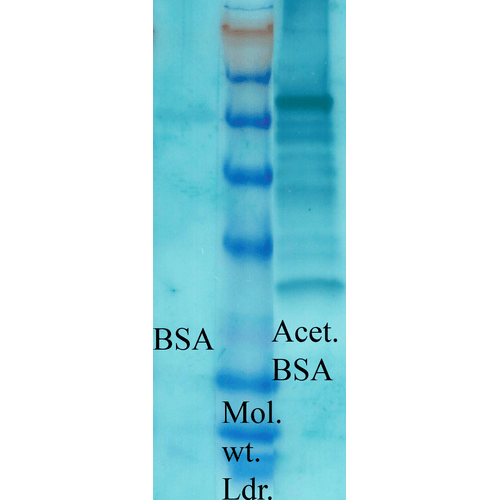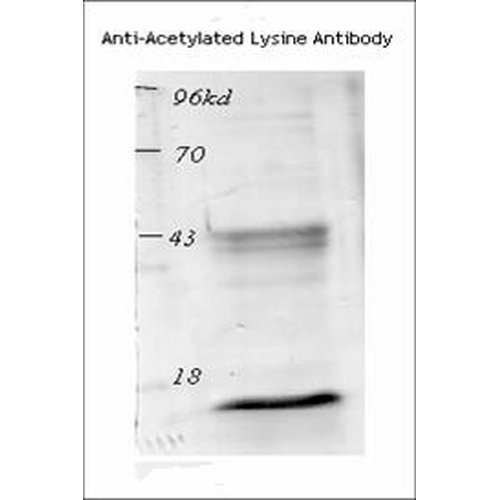Anti-Acetylated Lysine Antibody (56498)
Data
 Western blot analysis of Bovine serum albumin showing detection of Acetylated Lysine protein using Rabbit Anti-Acetylated Lysine Polyclonal Antibody (56498). Primary Antibody: Rabbit Anti-Acetylated Lysine Polyclonal Antibody (56498) at 1:1000. Acetylated lysine in BSA (Left) and Acetylated BSA (Right).
Western blot analysis of Bovine serum albumin showing detection of Acetylated Lysine protein using Rabbit Anti-Acetylated Lysine Polyclonal Antibody (56498). Primary Antibody: Rabbit Anti-Acetylated Lysine Polyclonal Antibody (56498) at 1:1000. Acetylated lysine in BSA (Left) and Acetylated BSA (Right). Immunocytochemistry/Immunofluorescence analysis using Rabbit Anti-Acetylated Lysine Polyclonal Antibody (56498). Tissue: Heat Shocked Cervical cancer cell line (HeLa). Species: Human. Fixation: 2% Formaldehyde for 20 min at RT. Primary Antibody: Rabbit Anti-Acetylated Lysine Polyclonal Antibody (56498) at 1:100 for 12 hours at 4°C. Secondary Antibody: FITC Goat Anti-Rabbit (green) at 1:200 for 2 hours at RT. Counterstain: DAPI (blue) nuclear stain at 1:40000 for 2 hours at RT. Localization: Nucleus. Cytoplasm. Magnification: 20x. (A) DAPI (blue) nuclear stain. (B) Anti-Acetylated Lysine Antibody. (C) Composite. Heat Shocked at 42°C for 1h.
Immunocytochemistry/Immunofluorescence analysis using Rabbit Anti-Acetylated Lysine Polyclonal Antibody (56498). Tissue: Heat Shocked Cervical cancer cell line (HeLa). Species: Human. Fixation: 2% Formaldehyde for 20 min at RT. Primary Antibody: Rabbit Anti-Acetylated Lysine Polyclonal Antibody (56498) at 1:100 for 12 hours at 4°C. Secondary Antibody: FITC Goat Anti-Rabbit (green) at 1:200 for 2 hours at RT. Counterstain: DAPI (blue) nuclear stain at 1:40000 for 2 hours at RT. Localization: Nucleus. Cytoplasm. Magnification: 20x. (A) DAPI (blue) nuclear stain. (B) Anti-Acetylated Lysine Antibody. (C) Composite. Heat Shocked at 42°C for 1h. - -
- -
Antibody DetailsProduct DetailsReactive Species All Host Species Rabbit Immunogen Acetylated lysine-KLH conjugate. Product Concentration Lot Specific Formulation PBS, pH 7.0 and 50% glycerol. State of Matter Liquid Product Preparation Purified by Protein A affinity chromatography Storage and Handling This product is stable for at least 1 year at -20°C. Freeze in multiple aliquots to avoid repeated freeze-thaw cycles. Regulatory Status For in vitro investigational use only. Not for
use in therapeutic or diagnostic procedures. Country of Origin USA Shipping Next Day 2-8°C Applications and Recommended Usage? Quality Tested by Leinco Immunoblotting: use at 1-2ug/mlELISA: use at 1-10ug/ml with acetylated lysine-containing proteins on the solid phase.
These are recommended concentrations. End user should determine optimal concentrations for their applications. Each investigator should determine their own optimal working dilution for specific applications. See directions on lot specific datasheets, as information may periodically change. DescriptionDescriptionSpecificity This antibody recognizes proteins containing acetylated lysine residues. It does not recognize non-acetylated proteins. Background Post-translational modifications of proteins play critical roles in the regulation and function of many biological processes. A common post-transcriptional modification of lysine is acetylation. The conserved amino- terminal domains of the four core histones (H2A, H2B, H3, and H4) contain lysines that are acetylated by histone acetyltransferases (HATs) and deacetylated by histone deacetylases (HDACs). Regulation of protein acetylation status is impaired in cancer and polyglutamine diseases, and HDACs have become promising targets for anti-cancer drugs currently in development. Research Area Neuroscience References & CitationsTechnical ProtocolsCertificate of Analysis |



